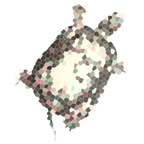Posts Tagged San Francisco Zoo
Western Pond Turtle – From Hatchling to Head Start
Posted by Matthew Bettelheim in Herpetology, Natural History, Western Pond Turtle on August 22, 2012
 As summer dwindles into fall, the days draw near when western pond turtles (Clemmys marmorata) eggs, having incubated in their subterranean nests over the last 80 to 100 days, will begin to stir (see also The Egg Drop). With August upon us, this is the time of year when hatchlings graduate from the nest, breaking free of their eggs to dig their way to the surface. And where three months earlier their mothers ventured onto land to nest far from the water’s edge, daring predators and extreme weather along the way, now the emerging hatchlings must run that gauntlet in reverse in search of their natal ponds and streams.
As summer dwindles into fall, the days draw near when western pond turtles (Clemmys marmorata) eggs, having incubated in their subterranean nests over the last 80 to 100 days, will begin to stir (see also The Egg Drop). With August upon us, this is the time of year when hatchlings graduate from the nest, breaking free of their eggs to dig their way to the surface. And where three months earlier their mothers ventured onto land to nest far from the water’s edge, daring predators and extreme weather along the way, now the emerging hatchlings must run that gauntlet in reverse in search of their natal ponds and streams.
Literally the size of an Oreo cookie at birth, and about as delectable to any skunks and foxes passing by, hatchlings are at their most vulnerable stage immediately after they’ve hatched, and will be for the next several years until they outgrow the maws and jaws of predators like the American bullfrog (Rana catesbeiana) and largemouth bass (Micropterus salmoides).
Since 2008, researchers lead by professor Nicholas Geist at Sonoma State University have partnered with the Oakland Zoo and San Francisco Zoo in a head-start initiative where, as part of a study investigating western pond turtle natural history (nesting patterns, breeding, habitat threats, incubation, growth, and diet), wild turtle eggs are collected, hatched, and reared in captivity. Under the care of keepers at the zoos, the hatchlings can attain the size of a wild 2- to 3-year-old turtle in as little as 10 months in captivity. Despite their youth, such captive-bred, Gamera-super-sized yearlings (minus the wings, fire-breath, and tusks) are better positioned to survive in the wild than their wild-reared counterparts. Head-start programs like this can help mitigate the decline in turtle “recruitment” (young turtles surviving to adulthood), just one of many factors suspected in the decline of western pond turtles.
Over the last two weeks, the San Francisco and Oakland zoos wrapped up year five of their head start program. In two different waves, a total of 82 yearling western pond turtles traded the big city lights for starry nights as they made their way back to their home in Lake County (read about it here and here).
Having worked together with the Geist Lab, the Oakland and San Francisco zoos, and countless graduate students and volunteers over the last five years, this summer marked the first year I was able to participate in the release party. After countless hours spent stalking nesting females, marking and recapturing adults, and getting peed on more often than a fire hydrant at the Westminster Kennel Club, I at long last saw the project come full circle.
For their trip by car from the zoo to the release site Friday morning, the turtles had been carefully packed in tubs lined with moistened peat moss. Gathering in the parking lot overlooking the lakeshore, the release party put in motion a water brigade weighing, measuring, and properly identifying each yearling turtle one last time before carefully repacking them for the last leg of their journey home. Emerging from the woods, we set off into the tule jungle, sinking deeper and deeper into the quickening sludge until wading the waist-deep, coffee-waters became a foregone conclusion.
With the water overtopping our boots and our belts, we took turns slipping each turtle one-by-one back into the sun-drenched waters their parents hailed from. Pushing off our outstretched fingertips into the murky water for the first time, they paddled in place, watching their liberators with uncanny curiosity. Their sudden immersion in this wild new world was entire; the staccato thrum of dragonfly wings, the bob of cattails dowsing in the breeze, the blush of sunlight dappling their pebbly skin. Acclimating at a turtle’s pace, they took their time becoming properly oriented to their surroundings before fading into the murky water and out of our line of sight.
And there we parted: we, to return to the lab and the zoos to foster the next generation of hatchlings already collected this year and under the keepers’ care; they, to hold up their end of the bargain. To survive. To thrive. And to return to us six, seven years from now to lay nests of their own, thereby entrusting us with future generations of western pond turtles.


